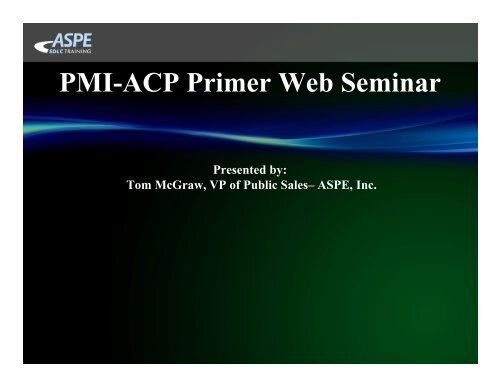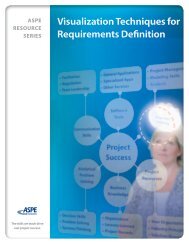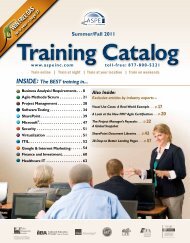PMI Agile Certified Practitioner (ACP) Primer - Aspe-sdlc.com
PMI Agile Certified Practitioner (ACP) Primer - Aspe-sdlc.com
PMI Agile Certified Practitioner (ACP) Primer - Aspe-sdlc.com
- No tags were found...
Create successful ePaper yourself
Turn your PDF publications into a flip-book with our unique Google optimized e-Paper software.
<strong>PMI</strong>-<strong>ACP</strong> <strong>Primer</strong> Web SeminarPresented by:Tom McGraw, VP of Public Sales– ASPE, Inc.
Why <strong>Agile</strong> for <strong>PMI</strong>• The question on the minds (and responses on theBlogs) of professionals on either side of the fence• It is simple– <strong>PMI</strong> recognizes that <strong>Agile</strong> is of growing importance inproject management– With any business, <strong>PMI</strong> had to acknowledge this anddoing something or nothing… they decided to dosomething
Vision for New Certification• If it has ties to project management, <strong>PMI</strong> wants to be a partof it. They see project management above any specificmethod or practice. So their spin on this cert:– Certification recognizes individual expertise using <strong>Agile</strong> practicesand shows professional versatility through <strong>Agile</strong> tools andtechniques– Certification carries a higher level of professional credibilitythrough its requirements– Certification supports individuals in meeting the needs oforganizations using a diversity of methods
Demographics• Employers—<strong>PMI</strong> wants you to know that:– Certification demonstrates to employers the practitioner’s level ofprofessionalism with <strong>Agile</strong> practices in software dev management• Employees—<strong>PMI</strong> wants to give you:– A tool to show professional versatility in both project managementtools and techniques– Both “traditional” PM and <strong>Agile</strong> PM experience and understanding
Application Requirements<strong>PMI</strong>‐<strong>ACP</strong> RequirementsEligibility Requirements:Education LevelDescription:Secondary degree (high school or equivalent) orhigherGeneral Project ManagementExperience<strong>Agile</strong> Project ManagementExperience<strong>Agile</strong> Project ManagementTrainingExaminationMaintenance2,000 hours working on project teams. These hoursmust be earned within the last 5 years. PMP is acceptableto fulfill these requirements1,500 hours working on <strong>Agile</strong> project teams or in <strong>Agile</strong>methodologies. These hours are in addition to the generalproject management experience requirements. These hoursmust be earned within the last three years21 contact hours; hours must be earned in <strong>Agile</strong> project managementtopics **<strong>ACP</strong> PDUs**Tests knowledge of <strong>Agile</strong> fundamentals and ability to apply to basicprojects30 PDUs or 3 CEUs every 3 years in <strong>Agile</strong> project managementNote: these hours would count toward fulfilling PMP requirementif individual holds both certifications
Fees<strong>PMI</strong>-<strong>ACP</strong> Certification FeesExam Administration Type <strong>PMI</strong> Member <strong>PMI</strong> Non memberComputer-based testing $435 $495Paper-based testing $385 $445Reexamination CBT $335 $395Reexamination PBT $285 $345CCR certification renewal $90 $130
Things to Know• Once you start the application process you have 90 days to <strong>com</strong>plete• Do online application if at all possible (takes five business days to process• Can’t schedule exam until application is approved and fees paid• If you are audited (possibly up to 25% of applications are randomly audited) you have90 days to respond, no eligibility until successful <strong>com</strong>pletion of audit• You have one year to take exam after application approval and you can retake theexam three times during that year• Your certification cycle starts the day you pass your exam and your cycle is 3 years.You need 30 PDUs in that cycle• You <strong>com</strong>plete renewal process once you have 30 PDUs and pay renewal fee• Certification suspension happens on the third anniversary of the day you passedyour exam and you have yet to renew (1 year period)• Certification expiration happens after suspension period if you do not fulfill yourrecertification requirement
CCR Snap-shot• CCR (Continuing Certification Requirements– Must follow to maintain an active certification– <strong>PMI</strong>-<strong>ACP</strong> certification cycle is three years from date ofexam pass– No less than 30 professional development units (PDUs)• Use the onsite CCR system to report PDUs• Complete online application for renewal– Reaffirm <strong>PMI</strong> code of ethics– Reaffirm <strong>PMI</strong> certification application/renewal agreement– Submit the credential renewal fee– PDU category, structure and policy
Exam Content Overview<strong>PMI</strong>-<strong>ACP</strong> Exam InformationScored Questions Unscored Questions Total Exam Questions100 20 120Alloted Examination Time3 hoursExamination is preceded by a tutorial and followed by a survey both are optional<strong>PMI</strong>-<strong>ACP</strong> Exam Blueprint<strong>Agile</strong> tools and techniques 50%<strong>Agile</strong> knowledge and skills 50%100%
Tools and Techniques detailTools and Techniques 50% of ExamCommunicationInformation radiator, team space, agile tooling, osmotic<strong>com</strong>munications for colocated/ditribute dteams dailystandupsPlanning, montioring and adaptinigRetrospectives, task/kanban boards, timeboxing, iterationand release planning, WIP limits, burn down/up chartscumulative flow diagrams, process tailoriing<strong>Agile</strong> estimation<strong>Agile</strong> analysis and designProduct qualityrelative sizing/story points wide band Delphi/planningpoker, affinity estimating, ideal timeProduct roadmap, user stories/backlog, story mapsprogressive elaboration wireframes, chartering personas,agile modelingfrequent verification and validation, test-drivendevelopment/test first development, acceptance testdrivendevelopment definition of done, continuousintegration
Tools and Techniques (continued)Soft skills negotiationemotional intelligence, collaboration, adaptiveleadership, negotiation, conflict resolution,servant leadershipValue-based prioritizationreturn on investment (ROI)/net present value(NPV)/internal rate of return (IRR), <strong>com</strong>pliance,customer-valued prioritization, minimallymarketable feature (MMF), relativeprioritization/rankingRisk managementrisk adjustment backlog, risk burn down graphs,risk-based spikeMetricsValue stream analysisVelocity cycle time, earned value management(EVM) for agile projects, escaped defectsvalue stream mapping
Knowledge and Skills (50% of exam)Knowledge and Skills ContentLevel% of Knowledge and Skill Content / % of ExamLevel 1 (18 Knowledge/skills areas) 65% / 33%Level 2 (12 Knowledge/skills areas) 25% /12%level 3 (13 Knowledge/skills areas) 10% / 5%
Level 1 (33% of total exam questions)Active listening<strong>Agile</strong> Manifesto values and principlesCommunity and stakeholder valueBrainstorming techniquesBuilding empowered teamsCoaching and mentoring within teamsCommunications managementFeedback techniquesIncremental deliveryKnowledge sharingLeadership tools and techniquesPrioritizationProblem-solving strategiesProject & quality standards for <strong>Agile</strong>Stakeholder managementTeam motivationTime, budget and cost estimationValue based de<strong>com</strong>position/prioritization
Level 2 (12% of total exam questions)<strong>Agile</strong> Frameworks and terminologyBuilding high-performance teamsBusiness case developmentColocation / distributed teamsContinuous improvement processesElements of project charter for an <strong>Agile</strong>projectFacilitation methodsParticipatory decision models<strong>PMI</strong>’s code of Ethics and ProfessionalConductProcess analysis techniquesSelf assessmentValue-based analysis
Level 3 (5% of total Exam questions)<strong>Agile</strong> contracting methods<strong>Agile</strong> project accounting principlesApplying new <strong>Agile</strong> practicesCompliance (organization)Control limits for <strong>Agile</strong> projectsFailure modes and alternativesGlobalization, culture and teamdiversityInnovation gamesPrinciples of systems thinkingRegulatory <strong>com</strong>plianceVariance and trend analysisVariations in <strong>Agile</strong> methods andapproachesVendor management
Domains and Tasks• Domains and tasks were NOT used in the construction ofthe certification examination, but they are important.They provide guidance for professional development– Domain I: Value-Drive Delivery– Domain II: Stakeholder Engagement– Domain III: Boosting Team Performance Practices– Domain IV: Adaptive Planning– Domain V: Problem Detection and Resolution– Domain VI: Continuous Improvement
Reference list• <strong>Agile</strong> Retrospectives: Making Good Teams Great Esther Derby, Diana Larsen, Ken Schwaber ISBN#0977616649• <strong>Agile</strong> Software Development: The Cooperative Game – 2nd Edition Alistair Cockburn ISBN#0321482751• The Software Project Manager’s Bridge to Agility Michele Sliger, Stacia Broderick ISBN#0321502752• Coaching <strong>Agile</strong> Teams Lyssa Adkins ISBN #0321637704• <strong>Agile</strong> Project Management: Creating Innovative Products – 2nd Edition Jim Highsmith ISBN#0321658396• Be<strong>com</strong>ing <strong>Agile</strong>: ...in an imperfect world Greg Smith, Ahmed Sidky ISBN #1933988258• <strong>Agile</strong> Estimating and Planning Mike Cohn ISBN #0131479415• The Art of <strong>Agile</strong> Development James Shore ISBN #0596527675• User Stories Applied: For <strong>Agile</strong> Software Development Mike Cohn ISBN #0321205685• <strong>Agile</strong> Project Management with Scrum Ken Schwaber ISBN #073561993X• Lean-<strong>Agile</strong> Software Development: Achieving Enterprise Agility Alan Shalloway, Guy Beaver, JamesR. Trott ISBN #0321532899
Training Options• Option #1– <strong>PMI</strong> <strong>Agile</strong> <strong>Certified</strong> <strong>Practitioner</strong> (<strong>PMI</strong>-<strong>ACP</strong>) Boot CampPreparation course for <strong>PMI</strong>-<strong>ACP</strong> Certification Exam• 3-day program• 2 days of in-depth <strong>Agile</strong> PM skills and tools training, 1 full day of exam test prep• Includes study guide• Option #2– <strong>Agile</strong> Boot Camp (21 PDUs)– <strong>Agile</strong> Essentials (7 PDUs) + <strong>Agile</strong> Project Management (14 PDUs)– No test prep option
Connection with Scrum Alliance Designations• Anyone’s guess?• Most likely it will be seen as more valued than CSMcertification and possibly on par with current CSP(<strong>Certified</strong> Scrum <strong>Practitioner</strong>)– CSM has no application . Requires training and assessment– CSP has difficult application and experience requirement. (requiresexam OR training)– The reality is that it is different. <strong>PMI</strong> is positioning it as showing a<strong>Practitioner</strong>s versatility and experience, not their <strong>Agile</strong>“ness”
Questions?877-800-5221info@aspe-<strong>sdlc</strong>.<strong>com</strong>
How to Claim Your PDU• Go to aspe‐<strong>sdlc</strong>.<strong>com</strong>/pdu/ for instructionson submitting your PDU.• You can submit your PDU by mail orelectronically.• The Activity code for today’s presentation isWS062311 and ASPE’s REP number is 2161.• The seminars are Category A for one PDU






